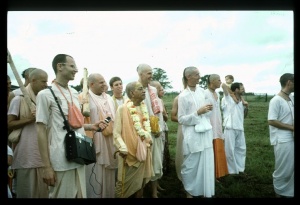CC Madhya 22.19: Difference between revisions
m (1 revision(s)) |
No edit summary |
||
| Line 1: | Line 1: | ||
{{ | [[Category:Sri Caitanya-caritamrta - Madhya-lila Chapter 22|C019]] | ||
<div style="float:left">'''[[Sri Caitanya-caritamrta|Śrī Caitanya-caritāmṛta]] - [[CC Madhya|Madhya-līlā]] - [[CC Madhya 22|Chapter 22: The Process of Devotional Service]]'''</div> | |||
<div style="float:right">[[File:Go-previous.png|link=CC Madhya 22.18|Madhya-līlā 22.18]] '''[[CC Madhya 22.18|Madhya-līlā 22.18]] - [[CC Madhya 22.20|Madhya-līlā 22.20]]''' [[File:Go-next.png|link=CC Madhya 22.20|Madhya-līlā 22.20]]</div> | |||
{{CompareVersions|CC|Madhya 22.19|CC 1975|CC 1996}} | |||
{{RandomImage}} | |||
==== TEXT 19 ==== | ==== TEXT 19 ==== | ||
<div | <div class="verse"> | ||
naiṣkarmyam apy acyuta-bhāva-varjitaṁ | :naiṣkarmyam apy acyuta-bhāva-varjitaṁ | ||
na śobhate jñānam alaṁ nirañjanam | :na śobhate jñānam alaṁ nirañjanam | ||
kutaḥ punaḥ śaśvad abhadram īśvare | :kutaḥ punaḥ śaśvad abhadram īśvare | ||
na cārpitaṁ karma yad apy akāraṇam | :na cārpitaṁ karma yad apy akāraṇam | ||
</div> | </div> | ||
| Line 14: | Line 18: | ||
==== SYNONYMS ==== | ==== SYNONYMS ==== | ||
<div | <div class="synonyms"> | ||
''naiṣkarmyam''—which does not produce enjoyment of the resultant action; ''api''—although; ''acyuta-bhāva''—of devotional service to the Supreme Personality of Godhead; ''varjitam''—devoid; ''na''—not; ''śobhate''—looks beautiful; ''jñānam''—speculative knowledge; ''alam''—exceedingly; ''nirañjanam''—which is without material contamination; ''kutaḥ''—how much less; ''punaḥ''—again; ''śaśvat''—always (at the time of practicing and at the time of achieving the goal); ''abhadram''—inauspicious; ''īśvare''—to the Supreme Personality of Godhead; ''na''—not; ''ca''—also; ''arpitam''—dedicated; ''karma''—activities; ''yat''—which; ''api''—although; ''akāraṇam''—causeless. | |||
</div> | </div> | ||
| Line 21: | Line 25: | ||
==== TRANSLATION ==== | ==== TRANSLATION ==== | ||
<div | <div class="translation"> | ||
"'When pure knowledge is beyond all material affinity but is not dedicated to the Supreme Personality of Godhead [Kṛṣṇa], it does not appear very beautiful, although it is knowledge without a material tinge. What, then, is the use of fruitive activities—which are naturally painful from the beginning and transient by nature—if they are not utilized for the devotional service of the Lord? How can they be very attractive?' | |||
</div> | </div> | ||
| Line 28: | Line 32: | ||
==== PURPORT ==== | ==== PURPORT ==== | ||
<div | <div class="purport"> | ||
This is a quotation from Śrīmad-Bhāgavatam ([[SB 1.5.12]]). Even after writing many Vedic literatures, Vyāsadeva felt very morose. Therefore his spiritual master, Nāradadeva, told him that he could be happy by writing about the activities of the Supreme Personality of Godhead. Up to that time, Śrīla Vyāsadeva had written the karma-kāṇḍa and jñāna-kāṇḍa sections of the Vedas, but he had not written about upāsanā-kāṇḍa, or bhakti. Thus his spiritual master, Nārada, chastised him and advised him to write about the activities of the Supreme Personality of Godhead. Therefore Vyāsadeva began writing Śrīmad-Bhāgavatam. | This is a quotation from [[Srimad-Bhagavatam|''Śrīmad-Bhāgavatam'']] ([[SB 1.5.12]]). Even after writing many Vedic literatures, Vyāsadeva felt very morose. Therefore his spiritual master, Nāradadeva, told him that he could be happy by writing about the activities of the Supreme Personality of Godhead. Up to that time, Śrīla Vyāsadeva had written the ''karma-kāṇḍa'' and ''jñāna-kāṇḍa'' sections of the ''Vedas'', but he had not written about ''upāsanā-kāṇḍa'', or ''bhakti''. Thus his spiritual master, Nārada, chastised him and advised him to write about the activities of the Supreme Personality of Godhead. Therefore Vyāsadeva began writing [[Srimad-Bhagavatam|''Śrīmad-Bhāgavatam'']]. | ||
</div> | </div> | ||
__NOTOC__ | |||
<div style="float:right; clear:both;">[[File:Go-previous.png|link=CC Madhya 22.18|Madhya-līlā 22.18]] '''[[CC Madhya 22.18|Madhya-līlā 22.18]] - [[CC Madhya 22.20|Madhya-līlā 22.20]]''' [[File:Go-next.png|link=CC Madhya 22.20|Madhya-līlā 22.20]]</div> | |||
__NOTOC__ | |||
__NOEDITSECTION__ | |||
Revision as of 11:10, 10 September 2021

A.C. Bhaktivedanta Swami Prabhupada
TEXT 19
- naiṣkarmyam apy acyuta-bhāva-varjitaṁ
- na śobhate jñānam alaṁ nirañjanam
- kutaḥ punaḥ śaśvad abhadram īśvare
- na cārpitaṁ karma yad apy akāraṇam
SYNONYMS
naiṣkarmyam—which does not produce enjoyment of the resultant action; api—although; acyuta-bhāva—of devotional service to the Supreme Personality of Godhead; varjitam—devoid; na—not; śobhate—looks beautiful; jñānam—speculative knowledge; alam—exceedingly; nirañjanam—which is without material contamination; kutaḥ—how much less; punaḥ—again; śaśvat—always (at the time of practicing and at the time of achieving the goal); abhadram—inauspicious; īśvare—to the Supreme Personality of Godhead; na—not; ca—also; arpitam—dedicated; karma—activities; yat—which; api—although; akāraṇam—causeless.
TRANSLATION
"'When pure knowledge is beyond all material affinity but is not dedicated to the Supreme Personality of Godhead [Kṛṣṇa], it does not appear very beautiful, although it is knowledge without a material tinge. What, then, is the use of fruitive activities—which are naturally painful from the beginning and transient by nature—if they are not utilized for the devotional service of the Lord? How can they be very attractive?'
PURPORT
This is a quotation from Śrīmad-Bhāgavatam (SB 1.5.12). Even after writing many Vedic literatures, Vyāsadeva felt very morose. Therefore his spiritual master, Nāradadeva, told him that he could be happy by writing about the activities of the Supreme Personality of Godhead. Up to that time, Śrīla Vyāsadeva had written the karma-kāṇḍa and jñāna-kāṇḍa sections of the Vedas, but he had not written about upāsanā-kāṇḍa, or bhakti. Thus his spiritual master, Nārada, chastised him and advised him to write about the activities of the Supreme Personality of Godhead. Therefore Vyāsadeva began writing Śrīmad-Bhāgavatam.